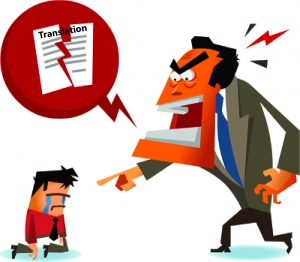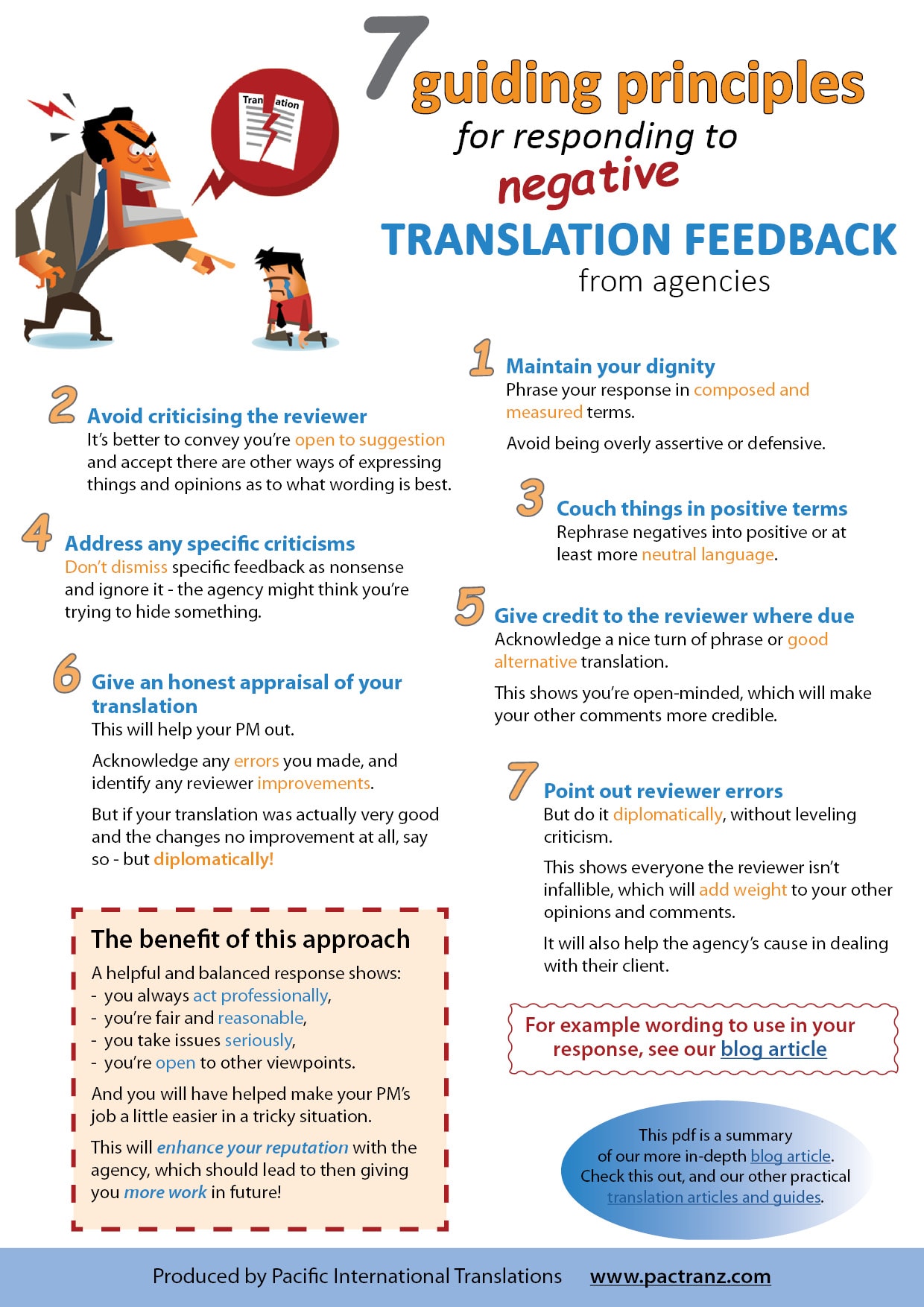If you’re like most freelance translators, you won’t enjoy being asked to respond to negative translation feedback.
But here’s the surprising thing:
When that request comes from an agency and the criticism of your translation is unwarranted …
… it’s actually a great opportunity.
Respond to the feedback in the right way and you can not only emerge with your reputation intact, but actually enhance your standing with that agency.
With the result they’ll want to give you even more translation work in future. Not bad!
Read on for why this would be, and the 7 keys to turning that negative feedback to your benefit.
Why responding to negative translation feedback the right way is so important
An agency would expect any freelance translator to be easy to deal with when translation projects run smoothly.

But they will really value those translators who they see as also responding professionally when a project gets messy.
When clients provide feedback critical of your translation quality, you won’t be the only one feeling the heat.
The agency project manager will be too.
And stressful situations have much more impact, and how things were handled will be remembered more intensely and for longer.
So how your PM interprets your response to the feedback will have a much bigger bearing on your ongoing relationship with the agency than your dealings in less emotional situations.
Responding to the feedback on your translation in a way that reinforces your professionalism as a translator and makes you PM’s life easier could bring you real benefit longer term.
It will powerfully underline to the PM that you are indeed the ideal sort of translator they want to be working with.
It’ll raise your value in the agency’s eyes – and that should lead to you being offered more work.
Now wouldn’t that be a great result to get from a situation most translators dread!
It simply means not taking the criticism of your translation personally and responding to the feedback as dispassionately and impartially as possible.
And of course addressing any specific issues raised.
Conversely …
Why you really shouldn’t send a stroppy reply when a reviewer criticises your translation
The PM and agency might:
- interpret that as you being unnecessarily defensive
- conclude you’re not very open to suggestions
- wonder if there mightn’t be something to the critical feedback after all
- think you’re probably not going to be that easy to deal with any time your translations are queried
- become hesitant to send you more work in the future
Now if your translation was actually perfectly fine and the feedback quite unjustified, this would be cruel indeed.
But it’s a possibility, and you should guard against it.
Your 7 guiding principles for extracting maximum advantage from unfavourable translation feedback
1. Maintain your dignity
Phrase your response to the feedback in composed and measured terms.
Ensure there’s nothing you say that someone could interpret as not being particularly professional.
Avoid any temptation to be overly assertive, or defensive.
The trick is to distance yourself from the personal element and try to view the feedback as simply a discussion on matters of language quality.
2. Avoid criticising the reviewer
Hard when the reviewer has unjustifiably criticised you, but your responding like for like won’t help your cause.
It’s much better to convey that you’re open to suggestion, accept there are other ways of expressing things, and people can have different views as to what wording is best.
3. Couch things in positive terms wherever possible
A reply full of words like “don’t”, “isn’t”, “disagree”, “wrong” can seem defensive, and possibly even aggressive.
Go through your response before sending it and check for any negatives.
See if they can’t be rephrased into positive or at least more neutral language.
For example:
“The reviewer says “XXX” is wrong, but it isn’t.”
might become:
“My “XXX” has been changed to “YYY”. These are both good alternative translations, and either can safely be used here.”
This still makes the point that your translation wasn’t wrong, without directly challenging the reviewer or his/her statement.
4. Address any specific criticisms of your translation
This is important.
It’s easy to dismiss the feedback on a specific aspect of your translation as nonsense and so not respond to it.
But ignoring it might lead your PM to think there could be some substance to the feedback after all and that you’re trying to hide something.
Leave no room for doubt on this score.
5. Give credit to the reviewer where warranted
Acknowledging a nice turn of phrase or good alternative translation by the reviewer achieves several things:
- It shows you are open to suggestion and prepared to judge any changes on their merits
- Your open mindedness will make any other comments you make seem more credible
- It gives the PM/agency the chance to repeat this to the client and so show that their response to the feedback is also balanced and reasonable
- It confirms to the PM/agency that you maintain your professionalism, even in difficult circumstances
6. Give an honest appraisal of your translation
It can be hard for a PM to know what’s what in this sort of situation. Particularly if he/she doesn’t know the language. And/or isn’t that experienced.
The feedback says X, the translator says Y. Who’s right?
Providing an honest assessment of the quality of your original translation should help the PM and be welcomed.
If there was indeed an error in your work, acknowledge it.
If your wording was acceptable but not particularly elegant in a couple of places and the reviewer has made some improvements, say so:
“In some parts the reviewer’s wording is very good, and I would be happy to accept it”
However if your translation was actually of a very good standard and the reviewer’s changes no improvement at all, you need to diplomatically convey this:
“I’ve had a close look at each of the changes made and also gone over my original translation again to have a fresh look at it. I’m comfortable that the translation I provided reads well and uses natural wording. And there’s nothing in it that stands out to me as clearly needing to be changed.
In that sense the reviewer’s changes can be seen as stylistic, his/her preferred way of saying what is essentially the same thing. We all see things differently and there are always several ways of expressing a concept, so I will respect his/her view. But personally I think overall I still prefer my original wording.
I hope this is useful, but please let me know if you’d like me to clarify any particular point.”
7. Point out reviewer errors – tactfully
If the reviewer has introduced errors into the text or changed meaning to something not in the source, the agency will want to know.
So tell your PM – but diplomatically, without leveling criticism at the reviewer.
“There looks to be a typo in the sentence beginning “…”. I think the reviewer meant “xxx” rather than “yyy”.”
“I notice the reviewer has translated “xxx” as meaning “yyy”, but I had interpreted this as “zzz”, which I think is more likely to be the intended meaning. I thought I should draw that to your attention.”
“Something your client may want to know is that the new wording has added some meaning that isn’t in the original, namely “xxx”. This may or may not be important, but I thought it best to tell you.”
This will emphasise to the PM/agency, if there was ever any doubt, that the translation feedback and reviewer comments/changes shouldn’t be accepted holus bolus.
And because the reviewer clearly isn’t infallible, it adds weight to any other opinions you might offer.
It will also help the agency’s cause if they can point this out to their client in their own response to the feedback.
And from the client’s point of view, learning this should demonstrate that maybe not everything their reviewer has said or done is warranted or correct after all.
Download this summary of these 7 principles.
Wrap up: the benefits of responding to translation feedback this way
Receiving unjustified negative translation feedback passed on from an agency’s client presents you with an opportunity.
Respond using the 7 simple guidelines outlined here and you’ll show the agency that:
- you always act professionally, even when things get awkward
- you’re fair and reasonable, and open to other viewpoints
- you take issues seriously, and are thorough
- you don’t create complications
In short, you’ll reinforce to the agency you’re a true pro and are always great to deal with.
What’s more, you’re directly helping your PM out by providing information and explanations the agency can use to respond to their client. Agencies love translators that make their life easier!
Because your PM is likely to be under some stress, your professional and helpful response will make a strong impact and will be long remembered.
As your stocks will rise, the result may well be increased job offers going forward.
– articles, guides, checklists, templates, even a nifty calculator
– all designed to help freelance translators with the practical side of being in business
– great tips for your website, cv, getting work, quoting, setting your rates and more
See our translator tips and resources page for the full list.
Or start with these 3 highly popular guides:
How to create a highly successful freelance translator website
How to write a freelance translator CV the agencies will love
The proven, dead simple way to get glowing client testimonials









